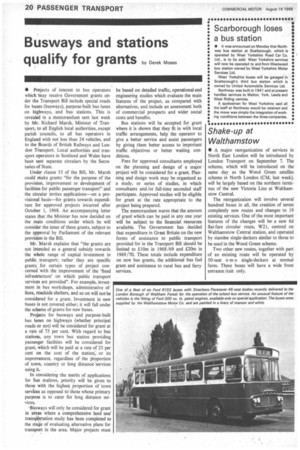Busways and stations
Page 22

If you've noticed an error in this article please click here to report it so we can fix it.
qualify for grants by Derek Moses
• Projects of interest to bus operators which 'may receive Government grants under the Transport Bill include special roads for buses (busways), purpose-built bus lanes on highways, and bus stations. This is revealed in a memorandum sent last week by Mr. Richard Marsh, Minister of Transport, to all English local authorities, except parish councils, to all bus operators in England with not less than 24 vehicles, and to the Boards of British Railways and London Transport. Local authorities and transport operators in Scotland and Wales have been sent separate circulars by the Secretaries of State.
Under clause 55 of the Bill, Mr. Marsh could make grants "for the purpose of the provision, improvement or development of facilities for public passenger transport" and the circular invites applications—on a provisional basis—for grants towards expenditure for approved projects incurred after October 1, 1968. An accompanying letter states that the Minister has now decided on the main conditions under which he will consider the issue of these grants, subject to the approval by Parliament of the relevant provision in the Bill.
Mr. Marsh explains that "the grants are not intended as a general subsidy towards the Whole range of capital investment in publio transport; rather they are specific grants for certain types of project concerned with the improvement of the 'fixed infrastructure' on which public transport services are provided". For example, investment in bus workshops, administrative offices, roadside shelters, and so on will not be considered for a grant. Investment in new buses is not covered either; it will fall under the scheme of grants for new buses.
Projects for busways and purpose-built bus lanes on highways (whether principal roads or not) will be considered for grant at a rate of 75 per cent. With regard to bus stations, any town bus station providing passenger facilities will be considered for grant, which will be paid at a rate of 25 per cent on the cost of the station; or its improvement, regardless of the proportion of town, country or long distance services using it.
In considering the merits of applications for bus stations, priority will be given to those with the highest proportion of town servtees as opposed to those whose primary purpose is to cater for long distance services,.
'Btisways will only be considered for grant in areas where a comprehensive land use/ transkrrtation study has been completed to the stage of evaluating alternative plans for transport in the area. Major projects must
be based on detailed traffic, operational and engineering studies which evaluate the main features of the project, as compared with alternatives, and include an assessment both of commercial prospects and wider social costs and benefits.
Bus stations will be accepted for grant where it is shown that they fit in with local traffic arrangements, help the operator to give a better service and assist passengers by giving them better access to important traffic objectives or better waiting conditions.
Fees for approved consultants employed on the planning and design of a major project will be considered for a grant. Planning and design work may be organized as a study, or series of studies, in which consultants and /or full-time seconded staff participate. Approved studies will be eligible for grant at the rate appropriate to the project being prepared.
The memorandum warns that the amount of grant which can be paid in any one year will be subject to the financial resources available. The Government has decided that expenditure in Great Britain on the new forms of assistance to public transport provided for in the Transport Bill should be limited to £10m in 1968/69 and £20m in 1969 /70. These totals include expenditure on new bus grants, the additional bus fuel grant and assistance to rural bus and ferry services.




































































































